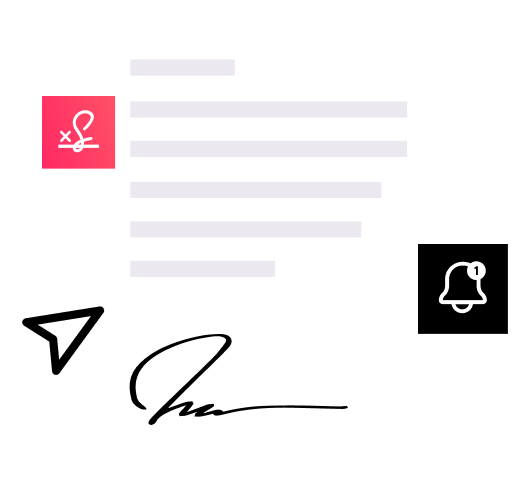Contract Management Software for Healthcare
Table of contents
- What is healthcare contract management software?
- Unique challenges in healthcare contract management
- How contract management software addresses these challenges
- Benefits of contract management software in healthcare
- How to choose the right healthcare contract management software
- Use cases for healthcare contract management software
- Conclusion
Contracts are crucial for healthcare organizations. They govern vendor relationships, ensure compliance with strict regulatory standards, and provide the structure for delivering quality patient care. From vendor agreements and insurance contracts to employment terms for medical staff, these documents touch every part of a healthcare organization.
But managing contracts in healthcare comes with unique challenges. The sheer volume, regulatory demands, and need for coordination across departments often overwhelm traditional methods like spreadsheets or shared drives. Missed deadlines, compliance issues, and inefficiencies can disrupt operations and increase costs.
That’s where healthcare contract management software comes in. Designed to address the complexities of the industry, this software helps hospitals and healthcare providers streamline their workflows, stay compliant, and focus on what matters most — patient care.
What is healthcare contract management software?
Healthcare or hospital contract management software is a tool that simplifies the way healthcare organizations handle their contracts. It acts as a centralized hub where agreements can be stored, managed, and tracked. Unlike generic contract tools, this software is tailored to the specific needs of the healthcare sector, offering features like compliance tracking, automated reminders, and robust data security.
For example, imagine a hospital managing hundreds of vendor contracts for medical supplies. Instead of scrambling through scattered files to find key terms or deadlines, healthcare contract management software brings everything together in one place. It doesn’t just store contracts — it makes them accessible, actionable, and easier to manage.
Unique challenges in healthcare contract management
The healthcare industry is uniquely demanding when it comes to contract management. Let’s break down some of the key challenges:
- The sheer volume of contracts
Hospitals and healthcare organizations handle agreements with vendors, insurers, medical staff, and service providers. Each contract has its own terms, obligations, and deadlines, making manual tracking almost impossible. - Regulatory compliance
Contract compliance with laws like HIPAA and HITECH isn’t optional — it’s mandatory. Contracts need to meet these stringent standards, and failure to comply can result in hefty fines or reputational damage. - Data security
Contracts in healthcare often include sensitive patient information, making data breaches a critical concern. Ensuring secure storage and access control is non-negotiable. - Cross-department coordination
Healthcare contracts often involve multiple stakeholders, including HR, legal, procurement, and clinical teams. Without a centralized system, miscommunication or delays can easily arise, stalling important decisions.
These challenges demand a solution that can bring clarity, organization, and efficiency to healthcare contract management.
How contract management software addresses these challenges
Contract management software is designed to tackle these pain points head-on. Here’s how:
- Centralized contract storage for quick access
All contracts are stored in one secure location, making it easy for authorized users to access agreements without sifting through multiple systems. - Automated compliance tracking
The software tracks regulatory deadlines and sends automated alerts, ensuring no critical compliance obligation is missed. - Streamlined workflows
Approvals, renewals, and even contract creation can be automated, reducing delays and freeing up staff for higher-priority tasks. - Role-based access control
Access is granted based on roles, ensuring that sensitive contracts are only visible to the right people.
These features not only save time but also reduce contract risks, making healthcare organizations more efficient and secure.
Benefits of contract management software in healthcare
For hospitals and healthcare providers, the benefits of contract management software go far beyond convenience:
- Compliance becomes manageable
With automated alerts and compliance tracking, organizations can meet regulatory requirements with confidence. This reduces the risk of penalties and helps maintain patient trust. - Cost control improves
By tracking payment schedules, renewal terms, and vendor obligations, healthcare organizations can better forecast costs and manage budgets. - Efficiency gains free up time for patient care
Automated workflows eliminate manual tasks, allowing staff to focus on delivering quality care rather than chasing approvals or searching for documents. - Reduced risk of disruptions
Tracking deadlines and obligations ensures that contracts are renewed on time, avoiding service interruptions or penalties. - Better vendor relationships
A centralized system provides visibility into vendor performance, helping procurement teams negotiate better terms and ensure accountability.
How to choose the right healthcare contract management software
Selecting the right contract management software isn’t just about ticking boxes. It’s about finding a solution that aligns with your organization’s needs. Here’s what to consider:
- Data security and compliance
Make sure the software meets healthcare-specific standards, such as HIPAA compliance, to protect sensitive patient and contract data. - Ease of use
A complicated system will slow down adoption. Look for intuitive interfaces that empower non-technical staff to navigate the platform easily. - Customizable workflows
Every healthcare organization is different. Choose software that can adapt to your unique approval processes and compliance requirements. - Scalability
As your organization grows, so will your contract volumes. Ensure the software can handle increased demand without sacrificing performance. - Integration capabilities
The software should integrate with existing tools like EHR systems or financial platforms to create a seamless workflow across departments.
Use cases for healthcare contract management software
Let’s look at some real-world scenarios where this software can make a difference:
- Managing vendor agreements: Track delivery timelines and ensure vendor performance meets the terms of their contracts.
- Streamlining physician contracts: Automate the approval and renewal process for employment agreements with medical staff.
- Ensuring compliance: Monitor contracts to stay on top of regulatory obligations, from patient privacy to safety standards.
- Tracking equipment maintenance contracts: Avoid service disruptions by staying ahead of maintenance deadlines and renewal terms.
Each use case highlights how contract management software isn’t just a convenience — it’s a necessity for healthcare organizations looking to operate smoothly and stay compliant.
Conclusion
Healthcare organizations face unique pressures when it comes to managing contracts, from maintaining compliance to ensuring seamless coordination across departments. Contract management software tailored to the healthcare industry addresses these challenges, transforming contracts from static documents into tools that drive efficiency and reduce risk.
By choosing the right platform, hospitals and healthcare providers can free up valuable resources, improve vendor relationships, and ensure compliance with confidence — all while keeping their focus where it belongs: on delivering excellent patient care.





